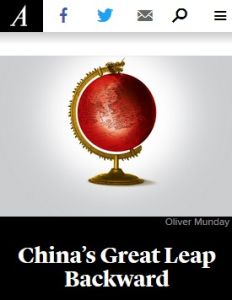Join getAbstract to access the summary!

Join getAbstract to access the summary!
James Fallows
China’s Great Leap Backward
The Atlantic, 2016
What's inside?
Is China hearkening back to its Mao-era roots? What does this mean for the rest of the world?
Recommendation
Few issues are more important globally than US–China relations. US policy toward China has remained relatively stable since the early 1970s. As Barack Obama says, the United States has “more to fear from a weakened, threatened China than a successful, rising China.” After embracing trade and, to some degree, civil liberties for its people, China has seen unprecedented growth and an elevated quality of life. But if China starts backpedaling, where does that leave the rest of the world? Always politically neutral, getAbstract recommends Fallow’s compelling Atlantic article to US policy makers, and – why not? – to both US president-elect Donald Trump and Chinese president Xi Jinping.
Summary
About the Author
James Fallows is a national correspondent for The Atlantic and the author of China Airborne.



















Comment on this summary